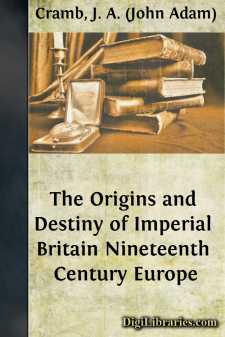Categories
- Antiques & Collectibles 13
- Architecture 36
- Art 48
- Bibles 22
- Biography & Autobiography 813
- Body, Mind & Spirit 142
- Business & Economics 28
- Children's Books 17
- Children's Fiction 14
- Computers 4
- Cooking 94
- Crafts & Hobbies 4
- Drama 346
- Education 46
- Family & Relationships 57
- Fiction 11829
- Games 19
- Gardening 17
- Health & Fitness 34
- History 1377
- House & Home 1
- Humor 147
- Juvenile Fiction 1873
- Juvenile Nonfiction 202
- Language Arts & Disciplines 88
- Law 16
- Literary Collections 686
- Literary Criticism 179
- Mathematics 13
- Medical 41
- Music 40
- Nature 179
- Non-Classifiable 1768
- Performing Arts 7
- Periodicals 1453
- Philosophy 64
- Photography 2
- Poetry 896
- Political Science 203
- Psychology 42
- Reference 154
- Religion 513
- Science 126
- Self-Help 84
- Social Science 81
- Sports & Recreation 34
- Study Aids 3
- Technology & Engineering 59
- Transportation 23
- Travel 463
- True Crime 29
The Origins and Destiny of Imperial Britain Nineteenth Century Europe
Description:
Excerpt
WHAT IS IMPERIALISM?
[Tuesday, May 8th, 1900]
The present age has rewritten the annals of the world, and set its own impress on the traditions of humanity. In no period has the burden of the past weighed so heavily upon the present, or the interpretation of its speculative import troubled the heart so profoundly, so intimately, so monotonously.
How remote we stand from the times when Raleigh could sit down in the Tower, and with less anxiety about his documents, State records, or stone monuments than would now be imperative in compiling the history of a county, proceed to write the History of the World! And in speculation it is the Tale, the fabula, the procession of impressive incidents and personages, which enthralls him, and with perfect fitness he closes his work with the noblest Invocation to Death that literature possesses. But beneath the variety or pathos of the Tale the present age ever apprehends a deeper meaning, or is oppressed by a sense of mystery, of wonder, or of sorrow unrevealed, which defies tears.
This revolution in our conception of History, this boundless industry which in Germany, France, England, Italy, has led to the printing of mountains of forgotten memoirs, correspondences, State papers, this endless sifting of evidence, this treasuring above riches of the slight results slowly and patiently drawn, is neither accident, nor transient caprice, nor antiquarian frenzy, but a phase of the guiding impulse, the supreme instinct of this age—the ardour to know all, to experience all, to be all, to suffer all, in a word, to know the Truth of things—if haply there come with it immortal life, even if there come with it silence and utter death. The deepened significance of history springs thus from the deepened significance of life, and the passion of our interest in the past from the passion of our interest in the present. The half-effaced image on a coin, the illuminated margin of a mediaeval manuscript, the smile on a fading picture—if these have become, as it were, fountains of unstable reveries, perpetuating the Wonder which is greater than Knowledge, it is a power from the present that invests them with this magic. Life has become more self-conscious; not of the narrow self merely, but of that deeper Self, the mystic Presence which works behind the veil.
World-history is no more the fairy tale whose end is death, but laden with eternal meanings, significances, intimations, swift gleams of the Timeless manifesting itself in Time. And the distinguishing function of History as a science lies in its ceaseless effort not only to lay bare, to crystallize the moments of all these manifestations, but to discover their connecting bond, the ties that unite them to each other and to the One, the hidden source of these varied manifestations, whether revealed as transcendent thought, art, or action.
Hence, as in prosecuting elsewhere our inquiry into the origin of the French Monarchy or the decline of oligarchic Venice, we examined not only the characters, incidents, policies immediately connected with the subject, but attempted an answer to the question—What is the place of these incidents in the universal scheme of things?...


